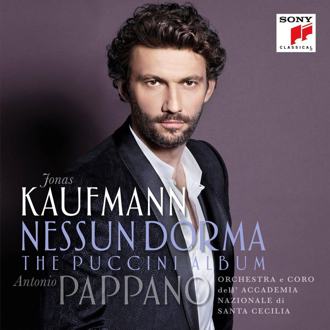|
|
|
|
|
|
|
|
|
Opera News, November 2015 |
| Judith Malafronte |
|
|
|
Critics Choice - Jonas Kaufmann: Nessun Dorma: The Puccini Album |
|

WHEN DECCA TRIED TO upstage Jonas Kaufmann’s Puccini recital on its rival
Sony label by releasing Jonas Kaufmann—The Age of Puccini in August, the
tenor urged fans to wait for the “real” album and forgo a hasty compilation
of previously released material with only three tracks actually by Puccini.
If the superstar tenor’s zillions of fans took his advice and waited for
Sony’s disc, they will be ecstatic that they did.
So what if he
avoided “Che gelida manina” and “E lucevan le stelle,” which appear on the
other disc? After a dazzling start with excerpts from Manon Lescaut, we hear
something from each of Puccini’s operas, arranged in order of composition,
offering a superb look at the composer’s development as well as Kaufmann’s
virtuoso vocal acting.
The recital opens with an exuberant “Donna non
vidi mai,” its unhurried tempo showcasing the tenor’s dark and massive
sound, yet with a soft edge that suggests des Grieux’s optimism and
innocence. Maintaining a clean line, Kaufmann murmurs “Sussurro gentil”
tenderly, before the final outburst “Deh! non cessar.” Manon and des
Grieux’s Act II love duet finds soprano Kristine Opolais partnering Kaufmann
(as she did in London performances last year) with sensitivity and
voluptuous sound. “Ah, Manon, mi tradisce” brings bitterness and snarling
outbursts from Kaufmann, as des Grieux sings of his shame and disgrace under
Manon’s control, and the tenor’s full-voiced desperation in “Ah! Non
v’avvicinate!” brings to mind Franco Corelli’s combination of heroic
declamation and heartbreaking poignancy.
A lighter sound
characterizes Le Villi’s Roberto, a young lad remorseful at the death of a
girl he jilted, and the title role in Puccini’s flop Edgar, with the tender
aria “Orgia, chimera dall’occhio vitreo.” La Bohème’s Act I finale, “O soave
fanciulla,” again with Opolais, is seductive in its intensity and restraint,
with invitingly caressed phrases. Tosca’s “Recondita armonia” showcases the
tenor’s superb breath control and supple legato in another luxuriously
unhurried tempo. La Fanciulla del West’s Dick Johnson recounts his life
story in “Or son sei mesi,” explaining how he became a bandit. Here, as well
as in his gallows plea, “Ch’ella mi creda,” Kaufmann endows the character
with unusual depth.
Antonio Pappano, whose unerring ear and superb
sense of musical drama guide the Orchestra di Santa Cecilia in luscious,
perfectly paced readings, cast Kaufmann in La Rondine early on. The tenor
pays the conductor homage with Ruggero’s hymn to Paris, and, for the sake of
completeness, Kaufmann includes Rinuccio’s “Firenze è come un albero
fiorito,” from Gianni Schicchi. He manages a crisp delivery at a brisk
tempo, but it’s a role he was never suited for. The dark lament of Il
Tabarro’s “Hai ben ragione” better fits Kaufmann’s somber, mournful timbre,
but it’s Calàf’s two arias from Turandot that magnificently display the
tenor’s tenderness, heroism, romantic temperament and stunning voice. When
might we hear him in this role?
|
|
|
|
|
|
|
|
|
|
|
|
|
|
|
|
|
|
|